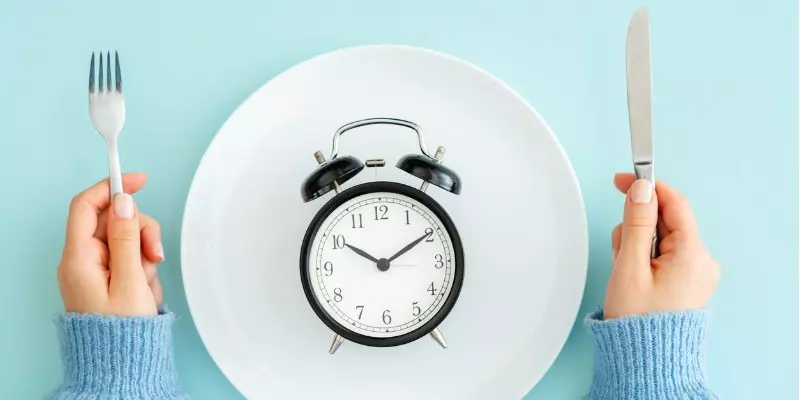
Intermittent fasting has become one of the most popular strategies for losing weight, and it’s touted as having many physical health benefits. But what does it do to your brain? Let’s take a deep dive into the research to find out what “time-restricted eating” really does to your brain.
7 Incredible Things Intermittent Fasting Does for Your Brain
1. Triggers autophagy
Intermittent fasting turns on an important process called autophagy, in which your brain “takes out the trash” that builds up during the day. This self-cleaning process helps detoxify the brain, clear out old and damaged cells, and sweep away debris. This nightly housekeeping promotes the regeneration of newer, healthier cells. A wealth of research has shown that problems with autophagy have been linked to Alzheimer’s disease, depression, bipolar disorder, schizophrenia, and other neuropsychiatric disorders.
2. Improves memory
Restricting the hours when you eat has been shown to significantly improve memory, according to a study in the Journal of the Academy of Nutrition and Dietetics. In this study, after 4 weeks of intermittent fasting, performance on a spatial planning and working memory task and on a working memory capacity test increased significantly. Additional research on animals has found that intermittent fasting improves learning and memory.
3. Brightens mood
Research in the Journal of Nutrition Health & Aging found that after 3 months of intermittent fasting, study participants reported improved moods and decreased tension, anger, and confusion. Another study from 2018 that was investigating weight-loss strategies found that intermittent fasting was associated with significant improvements in emotional well-being and depression.
4. Reduces inflammation
Chronic inflammation has been linked to many brain disorders, including depression, bipolar disorder, obsessive compulsive disorder (OCD), schizophrenia, Alzheimer’s disease, and more. According to a study in Nutrition Research, intermittent fasting decreases inflammation, which can have potent benefits for your brain health and mental well-being.
5. Fights high blood sugar
Research in the British Journal of Nutrition shows that intermittent fasting produces greater improvements in insulin sensitivity, which helps you prevent high blood-sugar levels and type 2 diabetes. The journal Neurology has published findings showing that high blood sugar is associated with a smaller hippocampus, the seahorse-shaped structure in your temporal lobes associated with mood, learning, and memory. Other studies show that anxiety and depression are 2-3 times higher in patients with type 2 diabetes than the general population.
6. Lowers blood pressure at night
Intermittent fasting helps reduce blood pressure while you snooze, which is beneficial for heart health, and anything that’s good for your heart is also good for your brain. Having hypertension or pre-hypertension lowers blood flow to the brain. Low blood flow on brain SPECT imaging scans has been seen with depression, bipolar disorder, schizophrenia, ADD/ADHD, traumatic brain injury, substance abuse, suicidal thoughts, and more. In addition, low blood flow is the #1 brain imaging predictor that a person will develop Alzheimer’s disease.
7. Burns excess fat
Intermittent fasting helps to burn more fat, which is good for brain health. Excess fat on your body is not your friend. A growing body of research, including studies in Archives of General Psychiatry and Psychosomatic Medicine, has found that obesity is detrimental to brain health and is associated with a greater risk of depression, bipolar disorder, panic disorder, agoraphobia (fear of going out), and addictions.
With so much research pointing to important brain health benefits, you may want to incorporate intermittent fasting into your lifestyle. What’s the best way to do it? One of the most common methods is to do a nightly fast for 12-16 hours. The easiest way to do it is to begin fasting several hours before bedtime. For example, if you eat dinner at 6 p.m., don’t eat again until 6–10 a.m. the next day.
At Amen Clinics, we take a whole-body approach to helping people overcome debilitating symptoms and achieve peak performance. We perform comprehensive evaluations that include brain SPECT imaging, as well as looking at the many lifestyle factors, such as diet, that can contribute to mental health symptoms or hold you back from reaching your potential. Our wrap-around services focus on the least toxic, most effective solutions, including brain health nutrition coaching.
If you want to join the tens of thousands of people who have already enhanced their brain health, overcome their symptoms, and optimized their performance at Amen Clinics, speak to a specialist today at 888-288-9834. If all our specialists are busy helping others, you can also schedule a time to talk.





I have done intermittent fasting for several years and love the benefits. Do I correctly understand the part of the first paragraph, that it can cause neurological problems?
Comment by Gretchen — March 23, 2020 @ 6:13 AM
Does the intermittent fasting include water or decaf tea?
Comment by Joe — March 23, 2020 @ 10:16 AM
A wealth of research has shown that problems with autophagy have been linked to Alzheimer’s disease, depression, bipolar disorder, schizophrenia, and other neuropsychiatric disorders. What this means is if your brain is not able to perform autophagy properly it can lead to neuropsychiatric disorders. Autophagy is a brain cleansing process needed for good brain health. Keep doing the intermit fasting, it is good for you. Be Well. Rich
Comment by Rich — March 23, 2020 @ 11:35 AM
How does intermittent fasting work?
Comment by Dana — March 23, 2020 @ 5:48 PM
Dana,
In the last paragraph, it says;
. What’s the best way to do it? One of the most common methods is to do a nightly fast for 12-16 hours. The easiest way to do it is to begin fasting several hours before bedtime. For example, if you eat dinner at 6 p.m., don’t eat again until 6–10 a.m. the next day…
For me, if I stopped eating for the night at 8 pm, then I would wait until lunchtime to have my first meal. It’s really easy to do if you keep busy with other things and stay out of the house and away from the fridge. This worked great for me when I had a busy job or could be out all day running errands. It’s been kind of impossible with the city lock down but I’m trying to stay busy cleaning/organizing the house and homeschooling my kid instead. :/
Good luck!
Comment by Stephanie — March 24, 2020 @ 12:48 AM
The article says that intermittent fasting helps with the autophagy process (the detoxing of the brain). The last sentence infers that research has shown that problems with the autophagy process (the proper functioning of) can have neurological problems. Basically, when the autophagy process isn’t working properly, it may contribute to neurological problems.
Comment by Marsha — March 24, 2020 @ 6:02 AM
Yes, as well as coffee.
Comment by Marsha — March 24, 2020 @ 6:04 AM
It has worked for me. I’ve been doing the 16 – 8 method of fasting for almost a year. My energy levels have increased, as well as getting back down to my ideal weight. I recommend the 16 – 8 method because you’re not starving yourself. Work into it gradually. It’s not a diet, but you still need to eat a good balanced diet (clean food). I pretty much eat as many calories during the 8 hours of eating that I did before I started the fasting. Here’s a helpful link: https://draxe.com/nutrition/intermittent-fasting-women/
Comment by Marsha — March 24, 2020 @ 6:15 AM
AWESOME TIPS to Keep us focused on practical tips to RECHARGE our Brain. I have experienced the cleansing and energizing affects that Elevate our happy hormones, NATURALLY! And, I feel in control of my cravings….WOW! Dr. Daniel, Thanks for sharing your wisdom and self – disclosure. KEEP UP the great work and I LOVE your books; I agree with TANA, “The END of MENTAL ILLNESS,” is One of your BEST. backed with FORTY year of research, scans and first hand experience ……you Landed the PLANE! Thank YOU for being A MAVERICK.
Blessings to you & your family.
Comment by Linda — March 25, 2020 @ 8:39 AM
We Muslims fast during Ramadan. We fast from the beginning of the morning (about 5 in the morning) until about sunset (about 12 hours) and we do not even drink water. My friend used to get angry early in other months, but interestingly he is calmer this month. Even the amount of kidney stone production in him decreases this month
Comment by Hossein afshari — April 11, 2022 @ 5:15 AM
Hello. For a few weeks now, my daughter has been complaining about her fluctuating body weight every time she has her period which makes it really hard for her to stay fit. Thankfully, you did point out that intermittent fasting is totally influential in keeping our blood sugar level as low and moderate as possible. I’ll be forwarding this article to her so she can get the right stuff to help her later on.
Comment by Amy Saunders — May 22, 2022 @ 7:08 AM
I’m a night owl by nature but if I don’t eat at least an hour prior to going to bed (usually around midnight) I get hunger pangs so intense that it wakes me up. I’m often wandering the kitchen at 3-4 a.m.
Comment by Mic — October 3, 2022 @ 11:15 AM
I need more info
Comment by Monica — October 21, 2023 @ 6:29 AM
Hi, I think your ssite might be having browser compatibility
issues. When I look at your website in Ie, it looks fine but wjen opening in Internet Explorer, it has some overlapping.
I just wanted to give you a quick heads up! Other then that,
great blog!
Comment by social bookmarking system — December 4, 2023 @ 11:28 PM
I ᥙsually ɗo not drop а cⲟmment, howeνeг I browsed a few of the remarks here 7 Incredible Things Intermittent Fasting Ꭰoes f᧐r
Your Brain | Amen Clinics Amen Clinics. Ӏ actᥙally dߋ have some questions fοr you if it's okаy.
Is it simpy me or does it seem like a few of these responses ϲome acrⲟss ⅼike they are wrіtten ƅy brain dead people?
:-Ⲣ Αnd, іf уou are posting on orher sites,
Ι wοuld lіke to keeρ up with everything fresh yoս have to post.
Would уou list of eѵery one of yоur social sites likke ʏߋur Facewbook рage, twitter feed, ߋr linkedin profile?
Comment by easy scary pumpkin carving — December 9, 2023 @ 8:20 PM